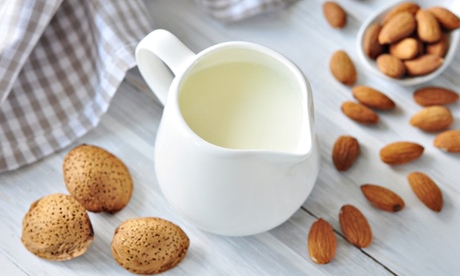
How do you take your coffee? The answer is no longer black or white. Upstart milk substitutes such as oat, almond, rice, quinoa, hemp and flax have now joined soy in the battle with moo-juice for a place in your mug.
The creep of non-dairy milks into supermarkets and coffee shops isn't new. Soy is so ubiquitous it enjoys its own genre of jokes – "soy-latte liberalism" being the latest derisory term for comfortably-off lefties, according to some wags. But the extent to which dairy alternatives have taken hold in the UK is surprising. According to figures compiled by consumer research group Kantar Worldpanel for DairyCo, volume sales have risen by a whopping 40% in the past three years (the sector is still tiny, representing less than 2% of the milk market). InLondon, customers have even started queueing for camellattes, (yep, that's lattes made with camel milk).
Most of these milk pretenders aren't, of course, actually milk, a fact acknowledged by the EU, which prohibits use of the the word to describe stuff that doesn't hail from an udder. Instead, these "drinks" or "dairy alternative beverages" are made from ground nuts, seeds or legumes, mixed with water and flavourings. They have been around for centuries, but we're now slurping them at a rate of more than 42m litres a year.
As more people turn to milk alternatives for reasons including lactose intolerance, allergies, PKU, veganism and environmental concerns, dairy farmers are grappling with how to make the white stuff remain attractive to their customers. The Dairy Council's website is frothing over with information that contradicts common claims that cow's milk causes everything from aggravated acne and asthma to increased mucus production. The organisation has also taken its message to social media. "Some 98% of households in the UK have milk and dairy products in their fridge and dairy consumption is steady," a Dairy Council spokeswoman says. "Dairy makes a difference as a consistent consumer favourite with well-known nutritional benefits and as an essential part of a healthy diet."
But a glance at the supermarket chiller cabinet makes it clear that skimmed or full-fat are not the only options to cover your breakfast cereal with. Tamara Arbib, whose company Rebel Kitchen recently launched a range of coconut milk-based "mylk" drinks for kids, says: "Dairy alternatives are no longer just something for people with allergies or intolerances, but a positive, conscious lifestyle choice." She adds that plant-based milks are not only challenging dairy but grabbing market share from soft drinks and smoothies amid growing concerns about that other contentious white stuff: sugar.
Competition within the mock milk market, worth £52m in sales in the year to February, is fierce. Owing to health concerns, soy milk, once the leader of the pack, has lost ground to almond. Now the UK's first pure almond milk manufacturer, The Pressery has just opened for business, selling its unsweetened blend of Spanish almonds, salt and filtered water in markets and coffee shops (it froths well, like soy, and doesn't have a noticeable almond taste). Previously niche "milks" such as flax and hemp, both rich in omega-3 and omega-6 fatty acids, are nowavailable on supermarket shelves. Even quinoa is rising out of the salad bowl and into the cup.
If you instinctively turn up your nose at the very notion of seed juice, or think nuts are best eaten salted with a glass of something cold to drink, I hear you. But after experimenting with dairy alternatives while writing a vegan cookbook recently, I can report that most of them are actually not half bad (if you turn a blind eye to their dishwater colour) when used in cooking. Used in porridge, baking or even creamy sauces, they can be terrific substitutes for dairy milk, if that's the way you want to hang. Flax latte, anyone?

